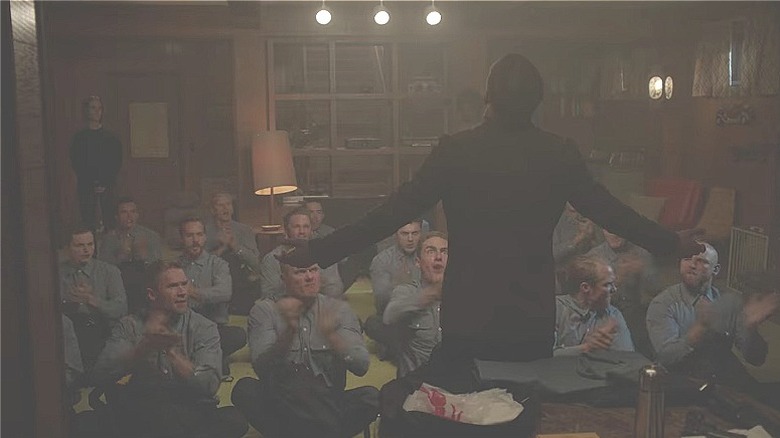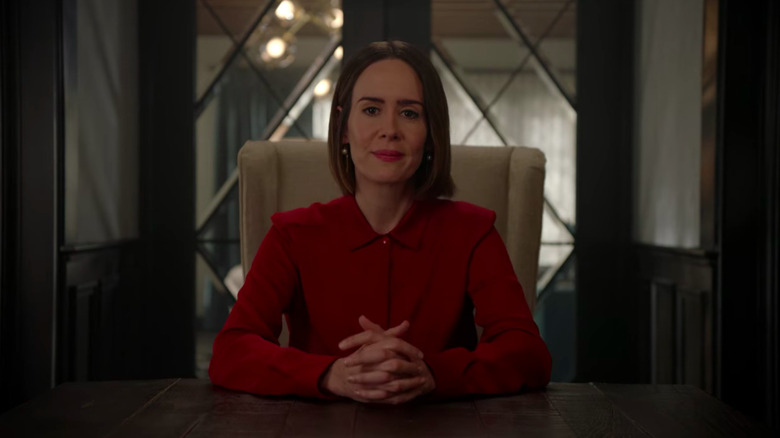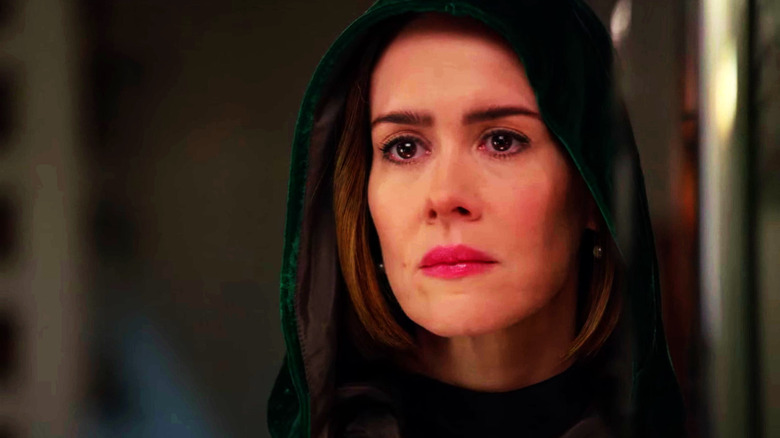The Ending Of American Horror Story Season 7 Explained
Rather than relying on the supernatural to scare viewers, Season 7 of "American Horror Story" tapped into more visceral fears: politics. Airing less than a year after the divisive 2016 U.S. presidential election, "Cult" was a timely, terrifying season rife with social and political buzzwords like "triggered," "snowflake," and "mansplaining."
The season is set in a Michigan community where many members are reeling from the election of Donald Trump, including the anxious Ally Mayfair-Richards (Sarah Paulson), who spirals out of control on election night. Meanwhile, Kai Anderson (Evan Peters), an aspiring cult leader, capitalizes on public rage and paranoia to begin a movement called Fear Is Truth.
By the finale, entitled "Great Again," Ally has pulled off a series of twists that allowed her to kill her backstabbing wife Ivy (Alison Pill), gain custody of their son, infiltrate Kai's cult, take them down via the FBI, and begin a successful political career.
Despite the heavy criticism, which often alleged tone-deafness and poor timing, "AHS: Cult" was nominated for seven Emmy Awards. Between the killer clowns, generalized politics, and various niche phobias, Season 7 of "American Horror Story" exists as a warped time capsule of a complicated year.
Let's unpack the season finale.
Breaking down the blindsides
Only three things are certain in life: death, taxes, and jaw-dropping plot twists in "American Horror Story." The final episode of "Cult" is full of blindsides, a tactic employed throughout the season to reflect the sliminess of politics. From start to finish, "Great Again" is unpredictable.
The episode opens with Kai being jumped by two inmates who claim that his cult is ruining the prison's gang-driven social hierarchies. However, it is revealed that one of the men is involved in Fear Is Truth when he kills the other attacker. While Kai is known for his scheming, most of the episode's blindsides come from Ally.
Ally convinces Speed Wagon (Cameron Cowperthwaite), who is secretly working with the police to reduce his drug charges, that she will help him expose the cult. After she gets enough information, though, she kills him. Then, she sends the FBI in to arrest the cult members just before their Charles Manson-inspired attack on pregnant women.
Kai pulls off another blindside, mutilating his desperate follower Trevor (Ian Bamberg). With their similar appearances and matching tattoos, it looks like Kai has died. This brutal act allows him to escape with the help of Gloria (Liz Jenkins). Little does he know, Gloria is working with Ally. The final blindside during a political debate is devastating for Kai, who attempts to kill Ally. Instead, he is executed by Beverly Hope (Adina Porter).
Under-the-table agreements propel Kai and Ally toward revenge, but her plans are more devious and fruitful.
What is Senator Mayfair-Richards up to?
After escaping the misogynistic cult, Ally becomes an inspiration to women everywhere. She quickly wins the Michigan Senate seat with 80% of the female vote after standing up to and surviving Kai's attack during the debate. It's fair to assume she sold hundreds of T-shirts embossed with the line, "There is something more dangerous in this world than a humiliated man: a nasty woman."
She may have won in a landslide, but her goal to dismantle the two-party system is lofty. With no political background and a murderous past that'll inevitably be exposed, how will she thrive as a politician? Her cult survivor girlboss shtick can only take her so far. As the embodiment of white women marching with signs that read, "If Hillary were president, we'd all be at brunch," Ally's political stance is shaky and unsustainable.
Perhaps that's why she seemingly joined another cult at the end of the finale. She explains her public service role to Oz, saying that she's meeting with some "very special, very powerful friends who are gonna help bring about that better world we were talking about." She describes them as a group of "powerful, empowered women" who want to alter the political system. Are these friends politically minded witches? Anarchists? Cult leaders? Or is it a revival of Valerie Solanas' S.C.U.M.?
"Great Again" leaves this question unanswered. The season ends with Ally staring blankly at her reflection as she dons a hooded green velvet robe, implying that she's joined yet another mysterious movement.
A return to the cult?
With an open ending and ties to other "American Horror Story" universes, the Season 7 finale may not have been the last of these storylines. Additionally, "Cult" has no supernatural lore and is set in modern times, so it could easily be worked into another story.
Nothing has been said about a "Cult" revival, but with producer Ryan Murphy's affinity for hiding Easter eggs and bringing back old characters, a return to the cultish Michigan city isn't out of the question. Murphy has even said that "Great Again" is his favorite episode of his favorite season, telling Entertainment Weekly, "the pairing of Paulson vs. Evan Peters was my favorite antagonist/protagonist thing we have ever done."
Evan Peters struggled to recover from this intense role, so it's unlikely that he would be thrilled to revisit the "Cult" character. But, if there's one thing "American Horror Story" fans have learned after nine seasons and a spin-off series, it's to always be ready for closed storylines to open back up — especially when it's something as relevant as political turmoil.



